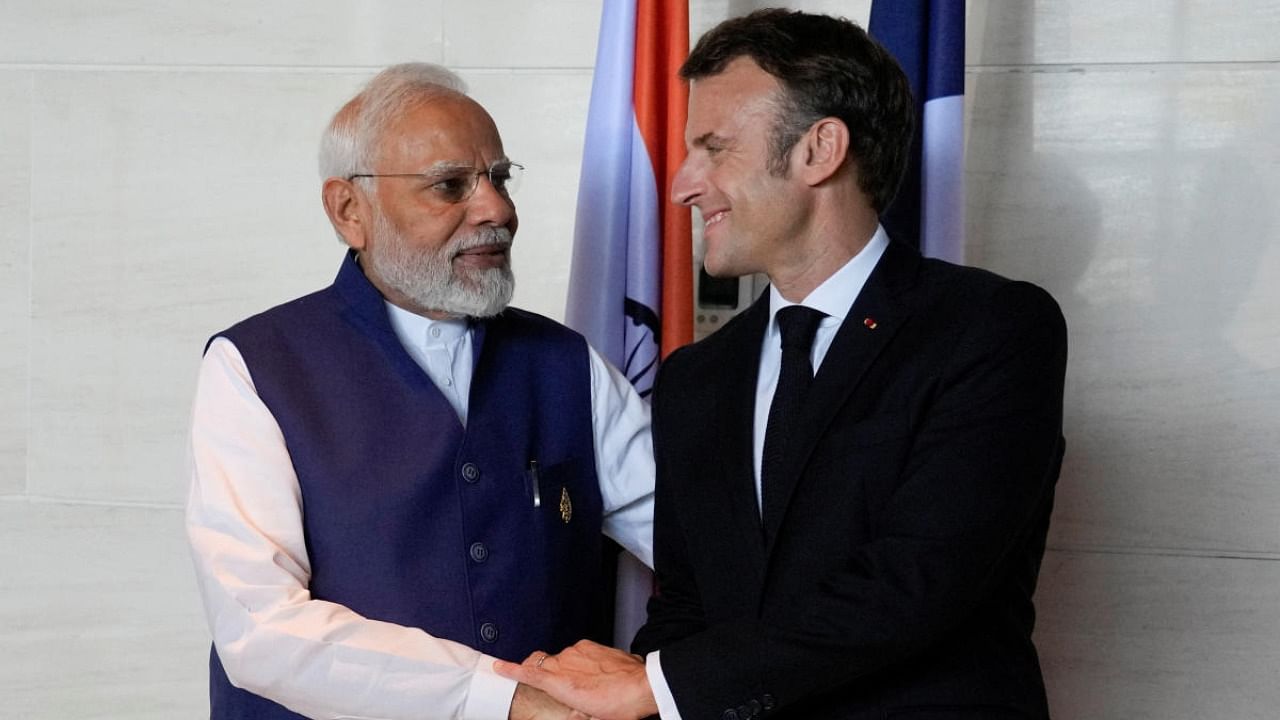
There is a saying that good friends are like apples on a tree. The best ones are always hard to find, and the rotten ones are the first ones to find. India has been going to France for decades to pick the apple. Has it been worthwhile?
Prime Minister Narendra Modi told the French newspaper Les Echos ahead of his visit to Paris on July 13-14 that India-France partnership aimed to advance a free, open, inclusive, secure, and stable Indo-Pacific region as well as to help other countries in the region. Modi claimed that the two countries are “resident powers” in the Indian Ocean, and are “influencing the course” of the Indo-Pacific.
In a viral video, India’s ambassador to France added that stronger Indo-French ties will be “beneficial globally”. These are massive statements to make at a time of transition in international politics. Empirical evidence is lacking. What is apparent is that France has extended an exceptionally warm red-carpet welcome to Modi. France put Modi on the same pedestal as Nelson Mandela, a hero of our times. Of course, others who have been conferred with the Grand Cross of the Legion of Honour, France's highest civilian and military honour, also included lesser mortals like former UN Secretary-General Boutros Boutros-Ghali.
French authorities carefully filter such decisions through the sieve of self-interests. France is adept at creating an aura of divinity where none exists when it has strong reason to create myths. Boutros Boutros-Ghali was helpful when France’s diabolical role in the 1994 genocide in Rwanda was a hot topic, as ethnic Hutu extremists targeted members of minority Tutsi community and slaughtered about 800,000 people in one hundred days of horrific genocide.
Survivors accused French troops of complicity in the massacre, deliberately abandoning them to Hutu extremists in the hills of Bisesero in western Rwanda. In fact, it goes to the credit of French President Emmanuel Macron that during a visit to Rwanda in 2021, he at least admitted, finally, France’s responsibility. France must remain grateful to Boutros Boutros-Ghali for the cover-up, whose term in office as UN Secretary-General remains tainted for his failure to act during the 1994 Rwandan genocide.
When it comes to India, France is obliged to flatter our leadership. The lure of the Indian arms bazaar is compelling. But we should have a sense of proportions. Why should we mix it with national honour? Why should Modi, elected leader of 1.4 billion people, feel “humbled”? After all, we pay good money for French weaponry.
To inject bromance is bad enough but to give it a further geopolitical twist is downright delusional. At any rate, India ought to be discreet while choosing European countries as its partners in the Indo-Pacific. When we speak of France being a “resident power”, in reality, New Delhi must be having in mind the Scattered Islands in the Indian Ocean — four small coral islands, an atoll and a reef that never had a permanent population and are contested by Comoros, Madagascar, and Mauritius — and principally, French Polynesia, the overseas collectivity of France, its sole overseas country comprising 121 geographically dispersed islands and atolls stretching over more than 2,000 kilometres in South Pacific Ocean. Basically, France has a colonial legacy in Africa and Asia that is not very different from Diego Garcia. Does that make it a “resident power”? Western dominance in Asia has a cruel history. India has no reason to identify with it.
Why not team up with the ASEAN countries? True, you rarely get to see them, but you know they're there. India’s Achilles' heel is QUAD. None of India’s neighbours or extended neighbours touches it with a barge pole. South Asian countries — Bangladesh, Nepal, Sri Lanka, Pakistan, Maldives — are flocking to SCO or BRICS, or both. Common sense dictates that any nation’s best firewall in the Time of Troubles is its friendly neighbourhood. India’s woe is almost beyond description.
There is hardly any strategic convergence possible with France for the pursuit of a containment strategy against China, if that is New Delhi’s fond hope. France has much higher stakes in the Chinese market than it has in India.
China plays the game astutely. Beijing green lighted Macron’s wish to be invited to the BRICS summit in South Africa. Russia had to bring some sanity into it by pointing out that BRICS opposes the weaponisation of sanctions, and France is part of the ‘collective West’.
Arguably, both China and India are delusional in lauding France’s independent foreign policies and strategic autonomy. Today’s France is not Charles de Gaulle’s. Macron lives in a real world where he needs to manoeuvre, choose when and where to abjectly surrender — be a vassal. Macron speaks occasionally about the criticality of Europe’s strategic autonomy vis-a-vis the United States, but neither Europeans nor Americans take him seriously, and he isn’t pressing the point, either.
Macron is a tough, self-made politician. After all, how many politicians could conjure up a Renaissance, his brand new liberal and centrist political party, and ride its wings in the 12 months ahead to storm the Bastilles to overthrow the despotism of established parties?
Once, during the tumultuous months as snowballing tensions began cascading to the war in Ukraine, Macron made an impromptu call to the Kremlin seeking out Russian President Vladimir Putin, who interrupted his evening workout on the ice hockey rink. But weeks later it transpired Macron was feigning and was only flaunting his access to the Kremlin leader to impress a clutch of French editors with him. Now, that is Macron for you. Putin never answered Macron’s calls since then.
(MK Bhadrakumar is a former diplomat.)
Disclaimer: The views expressed above are the author's own. They do not necessarily reflect the views of DH.